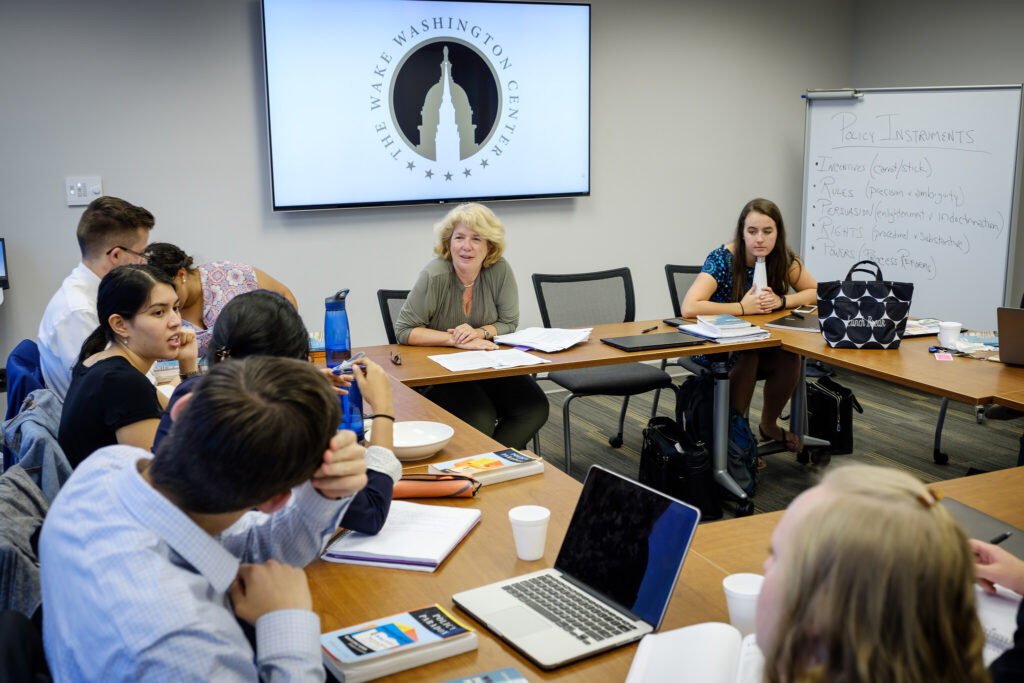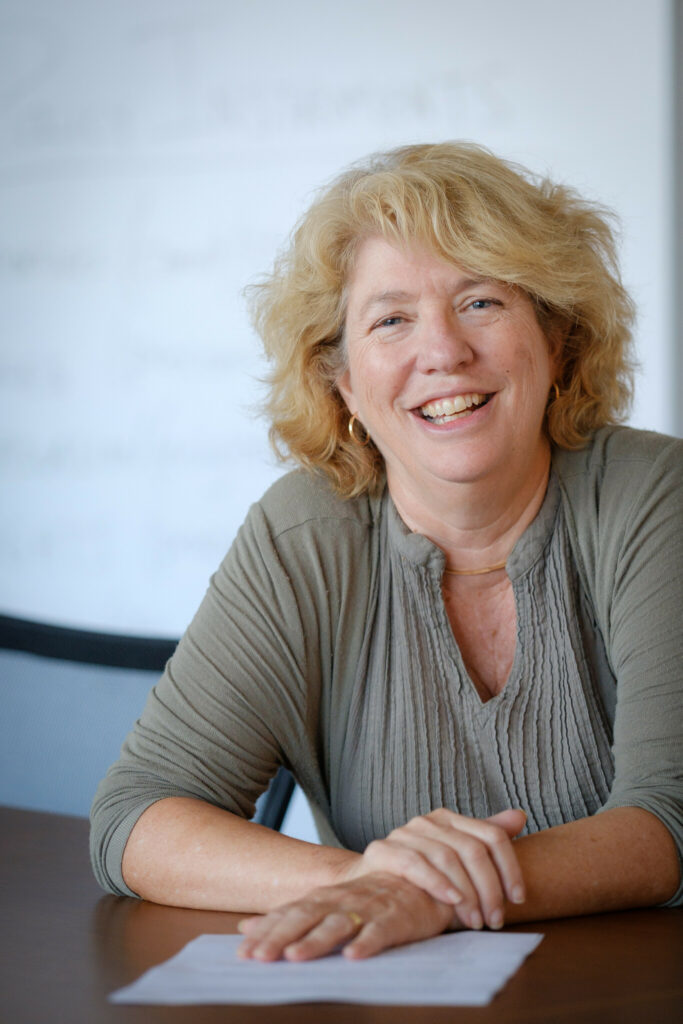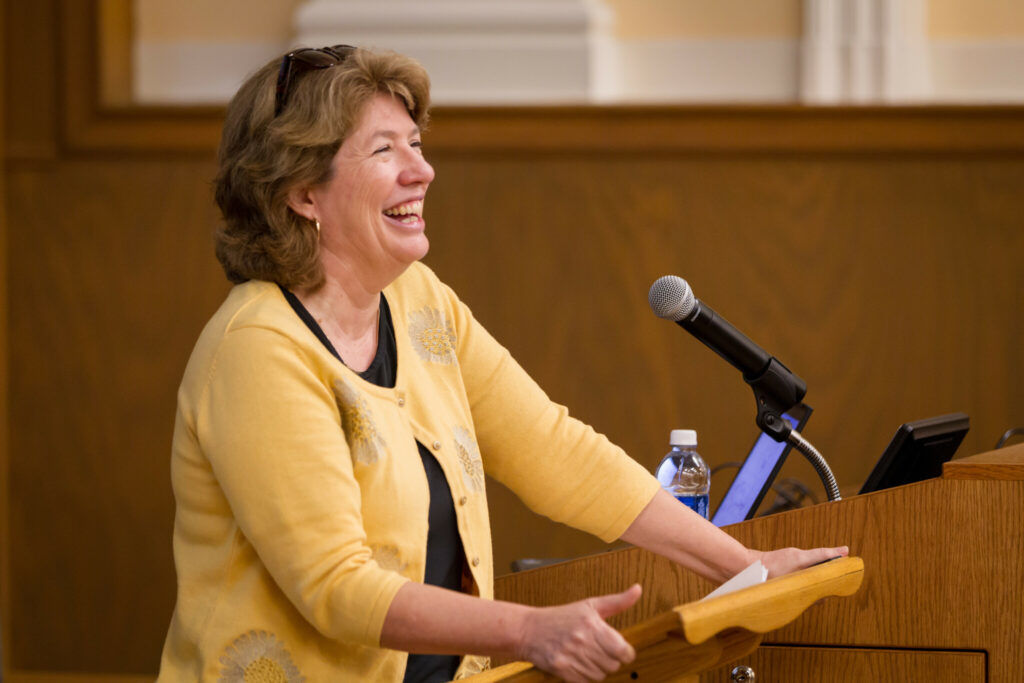Teacher-Scholar Legacies: Katy Harriger

By Peter Siavelis, Professor of Politics and International Affairs

After nearly 40 years of outstanding service to Wake Forest University, Professor Katy J. Harriger will be retiring from the Department of Politics and International Affairs, leaving behind a legacy as one of the University’s most respected teachers, scholars, mentors, and institutional citizens.
Professor Harriger arrived at Wake Forest in 1985, and over the decades, she has been a steady and influential force in shaping both the intellectual and civic life of the university. Known for her sharp wit, thoughtful scholarship, and unflagging commitment to her students and doing what’s right, Katy has helped generations of Wake Foresters think more deeply about law, democracy, and the responsibilities of citizenship.
A nationally recognized scholar of constitutional law, American politics, and civic education, Professor Harriger authored a landmark study on the federal special prosecutor, Independent Justice, and co-authored multiple editions of American Constitutional Law with Louis Fisher, one of the most widely used constitutional law texts in the country. Her research, teaching, and numerous other publications have consistently explored the tensions between law and politics and the vital role of citizen engagement in a healthy democracy.
But perhaps nowhere was Katy’s influence more deeply felt than in the classroom. A beloved and sought-after teacher, Katy had an extraordinary ability to challenge and inspire her students in equal measure. Despite her widespread reputation as a tough but fair teacher, her courses were always among the most popular in the department, and her legendary simulations in Constitutional Law became the stuff of campus lore. Student groups would research and present oral arguments on contemporary legal controversies, while another group took on the role of the Supreme Court, deliberating on the case as if they were Justices themselves.
“There has been no professor in my life as meaningful to me as Dr. Harriger. Her brilliance, love of teaching, mentorship, and occasional tough love helped me to become a better student and fledgling professional. She is the perfect intersection of kindness and expectation — willing to push you to become the best that you can be while never losing sight of who you are as a person. To learn from Dr. Harriger is to learn from Wake Forest’s finest, and she will be sorely missed.”
ay Sherrill (’20)
Throughout her career, Katy balanced her scholarly achievements, administrative leadership, and teaching excellence with an unshakable commitment to the ideal of civic education. Long before the term “civic engagement” became common currency in higher education, Katy was helping students understand the obligations and rewards of democratic participation. She was an early and active supporter of Democracy Matters on campus, co-chaired the Civic Learning and Democratic Engagement Committee, and served on the Public Engagement Advisory Board. From 2001 to 2005, Professor Harriger and Professor Emerita Jill McMillan worked with 30 “Democracy Fellows” at Wake Forest, teaching them deliberative dialogue and comparing their growth to peers not exposed to the training. The fellows showed a stronger grasp of citizen engagement and the long-term value of deliberation, findings later published in Speaking of Politics: Preparing College Students for Democratic Citizenship through Deliberative Dialogue. In each of these roles and pursuits, she championed the belief that universities should prepare students not only for careers but for citizenship.
Her passion for teaching and mentorship was recognized at the highest levels. Katy is one of the handful of faculty members to have won both of Wake Forest University’s top teaching honors: the Reid-Doyle Prize for Excellence in Teaching and the Jon Reinhardt Award for Distinguished Teaching. Beyond the Forest, her excellence in the classroom earned her national recognition as well: she was the recipient of the American Political Science Association’s prestigious Distinguished Teaching Award and a finalist for the Cherry Award for Great Teaching — one of the most esteemed honors in American higher education.

But her contributions to Wake Forest extended far beyond the classroom and the page. If there’s a committee, council, board, or initiative on campus with “university service” in its DNA, chances are good Katy has been part of it — and probably chaired it, too. Her list of service roles reads like a roadmap of institutional commitment: from her early years advising pre-law students and Mortar Board, to her leadership on the University Senate, the Senior Appointments Committee, and the Faculty Representative role on the Board of Trustees. She was not only a participant but a leader, chairing the Faculty and Administration Compensation Committee, the College Chairs group, and the Civic Learning and Democratic Engagement Committee, among many others.
It’s easy to assume that something as central as the Center for the Advancement of Teaching has always been part of Wake Forest’s academic landscape. But that’s far from true. More than 30 years ago, Katy recognized the need for a faculty-led space devoted to improving teaching — one designed by faculty, for faculty — and she was instrumental not only in envisioning it, but also in bringing it to life as the founding director of what was then known as the Teaching and Learning Center.
And of course, there’s the Wake Washington program, another initiative that bears Katy’s signature leadership. Long before the program took shape, the idea of a D.C. semester had been circulating, but it was Katy — together with Jennifer Richwine — who transformed that idea into the exceptional program it is today. Since its launch, Katy has served as its inaugural director, and students consistently speak in glowing terms about her mentorship and about how deeply the experience shaped both their academic and personal lives.
In true Harriger fashion, she also bridged the gap between campus and the broader world, directing students in experiential learning programs through Wake Washington and leading Wake Foresters abroad as Faculty Director in London and at Flow House in Vienna. Whether working with students in Washington, D.C., mentoring future Rhodes and Truman Scholars, or guiding lower-division students as an adviser, Katy has always taken an active role in helping students become engaged and thoughtful members of their communities.
Alongside her impressive professional accomplishments, Katy’s colleagues have come to know her as someone who leads with quiet confidence, a keen sense of humor, and a deep belief in the power of democratic dialogue. Her commitment to cultivating informed and engaged citizens — whether in the classroom, through faculty governance, or in the community — stands as a model for what it means to be a teacher-scholar at Wake Forest.
Please join us in celebrating the remarkable career and well-deserved retirement of Professor Katy J. Harriger — an irreplaceable member of the Wake Forest community. While Katy’s departure marks the end of an era, her influence will continue to shape the university for years to come. Her students and colleagues will miss her steady hand, sharp insights, and unfailing generosity. Still, students and colleagues alike wish her a well-deserved retirement — one filled with endless books, new adventures, and her continuing pursuit of the spiciest meal on the planet.

